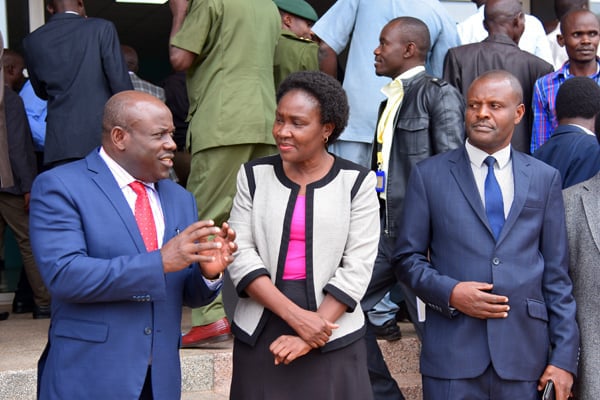
An invigilator checks students at Lakeside College Luzira before sitting for their first paper of Uganda Advanced Certificate of Education (UACE) on April 12, 2021. PHOTO/FILE
|National
Prime
A-Level students to study for five years
What you need to know:
- Learners who will fail UACE examinations will now be required to re-take only a failed subject
Students across the country, who will qualify to join A-Level education, will now be required to study for up to five years, should the government approve the new A-Level curriculum in the offing.
Initially, students have been studying Senior Five and Six in two years’ time before joining universities.
According to the proposed amendments in the A-Level curriculum, the tenure for A-Level will be a minimum of two years and maximum of five years to enhance inclusivity.
General Paper, which was initially being offered by all students, will be replaced with contemporary studies such as generic, ICT and research skills; financial literacy, basic nutrition, climate change, functional statistics and peace building.
Retakes
Learners who will fail Uganda Advanced Certificate of Education (UACE) examinations will now be required to repeat only a failed subject. Initially, if a learner failed to attain two principle passes, they would be required to repeat the entire examination.
This is witnessed at universities where a student who fails a paper is allowed to proceed to the next semester, and retake the paper he or she failed later.
School-based assessment set to constitute 20 percent of the end of cycle grade has also been introduced at this level, just like it was done in the new lower secondary curriculum.
This means students will be working for an 80 percent mark when they sit for UACE examinations conducted by Uganda National Examinations Board (Uneb).
In an interview with Saturday Monitor yesterday, the deputy director curriculum review and instructional materials development at the National Curriculum Development Centre (NCDC), Ms Bernadette Nambi, said the five years component is to enable a student who will not be able to finish A-Level in two years retake all the papers he or she will fail.
“You know some students are not very bright. These learners will be given a chance to finish all the papers they might fail in a period of five years. Since there is a high dropout rate under this level, we want to make it more flexible so that students are given an opportunity to finish all their papers in five years,” Ms Nambi said.
ALSO READ: How new curriculum will affect S.3 students
Between 2021 and 2022, NCDC conducted a needs assessment study to identify the gaps in the current A-Level curriculum and findings established it does not align to the current new lower secondary curriculum, does not equip graduates with functional skills to adequately address the social and economic needs of the country, and the students cannot apply the acquired knowledge and skills when they join the labour market.
The findings also revealed that the current curriculum was also not aligned to the international curriculum and was not aligned to the emerging issues like digital literacy, climate change, sustainable development goals, globalisation and global epidemics.
It is against the above background that the Ministry of Education, through the NCDC, wants to change the A-Level curriculum so that when students undertaking the new lower secondary curriculum move to A-Level, they find a harmonised curriculum.
The new curriculum will, therefore, see a reduction and harmonisation of content across subjects to get rid of repetitions and obsolete content while integrating emerging issues.
ICT will also be integrated in all subjects as a tool for learning, and there will be an emphasis in practical, generic skills, values and attitudes across all subjects.
Pioneers
The pioneer students, who are undertaking the current lower secondary curriculum, are sitting for their UCE next year in 2023. This means these will join Senior Five in 2025.
Sr Gladys Kachope, the head teacher of Immaculate Hearts Girls Secondary School in Rukungiri District, said they are comfortable with the new curriculum, but called for enough time to prepare the teachers.
“We need enough preparations this time before it is rolled out to avoid the many challenges we had during the rolling out of the current lower secondary curriculum. The materials should be also be prepared on time,” she said yesterday.
Proposed subjects
Humanities
CRE
IRE
Geography
History & Political Education
Literature
Sciences
Mathematics
Physics
Chemistry
Biology
Vocational
ICT
Art and Design
Technology and Design
Nutrition and Food Technology
Textile and Clothing Technology
Performing Arts
Economics
Entrepreneurship
Accounting
Agriculture
Physical Education
Languages
Local languages
Foreign languages
Kiswahili
Ugandan sign languages




